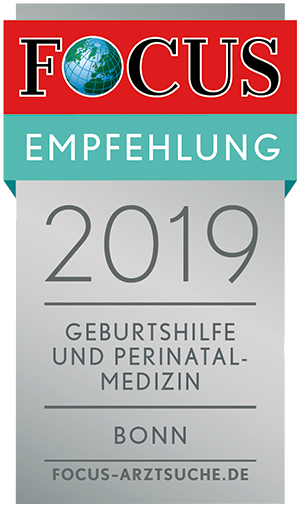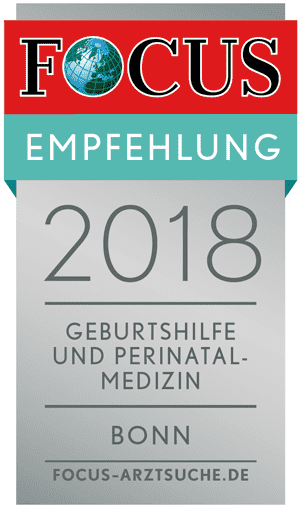
Ultrasound - the window to your child
The ultrasound scanner is the most important tool for examination in our practice.
Ultrasound examinations are safe for mother and child. Along with the prescribed ultrasound examinations according to maternity guidelines,
there are further examinations that are more extensive and informative.
Using the various ultrasound examinations, such as first trimester screening
or detailed fetal ultrasound examination at 20.weeks, we can provide you with individual information about your pregnancy. In many cases, invasive diagnostic methods such as amniocentesis or chorionic villus sampling
are not necessary.
Chromosome analysis
In order to obtain detailed information about the genetic make-up in the chromosomes of the unborn baby, we examine the baby’s cells that have previously been collected from the amniotic fluid, umbilical cord blood or placenta.
We offer various examination methods, such as amniotic fluid and placenta analysis. Both of these procedures can also be performed as rapid analysis tests, in which case you find out the results the next day.
We will discuss which diagnostic methods are most suitable for you and your child in detail, during personal consultation.
Examination methods
- Early organ screening
- Detailed fetal scan
- Pre-eclampsia screening
- Echocardiography
- Doppler sonography
- Amniocentesis
- Chorionic villus sampling
- Non invasive prenatal diagnostics
Early organ screening (nuchal scan):
We use this examination to detect developmental abnormalities in the foetus early on. An early sonographic assessment of the child’s organ development is performed between 11+0 and 13+6 weeks of pregnancy. At the same time, we can rule out serious chromosomal abnormalities to a large extent. We can get a better idea of your personal risk by means of an additional biochemical examination of your blood sample. Many of our patients decide not to have an invasive diagnostic test such as amniocentesis or chorionic villus sampling if the results of this examination point to a low risk.
Detailed fetal ultrasound examination at 20. weeks
This examination of fetal organs and development will be done at 19+0 weeks of pregnancy until 23+0 weeks of pregnancy, depending on indications. This is the best time for an ultrasound examination of the baby. During this examination, we perform detailed scan of your child in order to rule out possible abnormalities or genetic disorders, to a large extent. We will find out about potential risks concernig your pregnancy like gestational diabetes, preterm birth or fetal growth restriction. We will provide you with detailed information and advice about the possible obstetric risks that may be revealed by the results of the examination.
Pre-eclampsia screening
Pre-eclampsia (gestosis, toxaemia of pregnancy) is a serious condition accompanied by high blood pressure, oedema and proteinuria in the pregnancy.This illness considerably increases the risk of a premature birth. Nowadays it possible to assess a pregnant woman’s individual risk of developing this disease and to begin preventive treatment, if necessary, as early as the first trimester, between 11+0 and 13+6 weeks of pregnancy.
Fetal echocardiography
Fetal echocardiography is an ultrasound examination of the unborn child’s heart. An early examination can be performed during first trimester screening. The best time for this examination is between 19+0 and 22+0 weeks of pregnancy. The majority of heart defects can be spotted early on and, if this is the case, we will give you individual advice: explain possible complications, risks and recommend appropriate obstetric care. You will get all available information to make sure that your child has the best possible start in life.
Doppler ultrasound
This colour-coded ultrasound examination allows us to find out whether your child is getting enough nutrition and oxygen. The umbilical cord blood flow, as well as blood flow in the baby’s other arterial and venous vessels, gives us information about the foetus’ circulation and about how well it is.
In pregnancies complicated by diabetes or high blood pressure, i.e. high-risk pregnancies, it is also important to check the placental blood circulation.
This examination method if done by specialists does not pose any risks to mum or the unborn baby.
Amniocentesis
Amniocentesis can be used to diagnose genetic disorders of the fetus. Using ultrasound as a visual guide, we collect a small quantity of amniotic fluid from the amniotic sac, using a special needle. The ultrasound helps us to make absolutely certain that the needle is inserted far enough away from the fetus. Local anaesthetic is not required for this procedure. We perform this examination from 15+0 weeks of pregnancy. The results of a rapid analysis test for the most common chromosomal abnormalities are already available for patients the next day. The conclusive assessment takes around ten to twelve days.
Chorionic villus sampling
Chorionic villus sampling is a biopsy of the placenta. We can use this examination from 11+0 weeks of pregnancy to rule out chromosomal abnormalities as well as some genetic disorders
(for example, cystic fibrosis and muscular dystrophy) in the unborn child. We collect tissue from the placenta using a hollow needle that is guided through the mother’s abdominal wall. During this procedure, the needle remains exclusively in the placenta and does not come into contact with the amniotic sac. We carry out this examination under local anaesthics. The results of the rapid analysis test are available to patients within one or two days.
The complete analysis and evaluation takes around three to six days.
Non invasive prenatal diagnostics using analysis of the mother’s blood
Fragments of fetal genetic material are present in the blood of the pregnant woman. Using maternal blood analysis of the baby’s genotype (DNA fragments), it is possible to detect whether the unborn baby has Down syndrome (trisomy 21) or not. This test can also be used to detect trisomy 13 and 18. If there is an increased risk for this chromosomal anomalies,the test can be carried out in first trimester of pregnancy.
In our practice you can choose between Harmony Test (Cenata) and Prena Test (Life Codexx). The test is an IGeL service and will not be paid for by statutory health insurance institutions.
Examination methods
- Early organ screening
- Detailed fetal scan
- Pre-eclampsia screening
- Echocardiography
- Doppler sonography
- Amniocentesis
- Chorionic villus sampling
- Trisomy testing
Technical equipment
Ultrasound device
- Voluson E10 BT15
- Voluson E8 Expert
Computerised cardiotocography
- Oxford CTG


